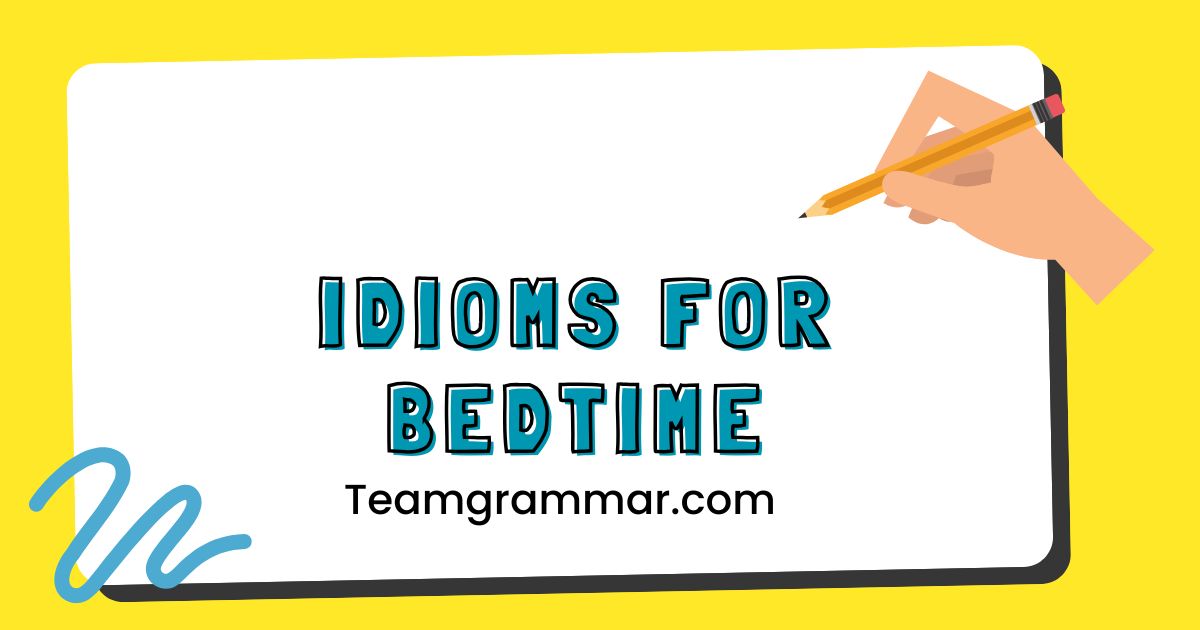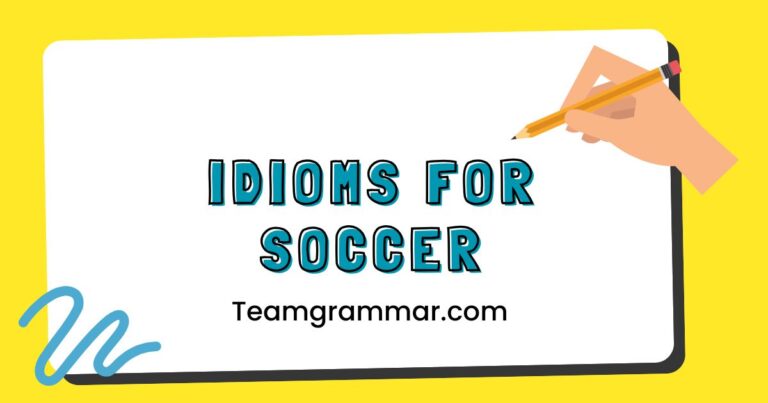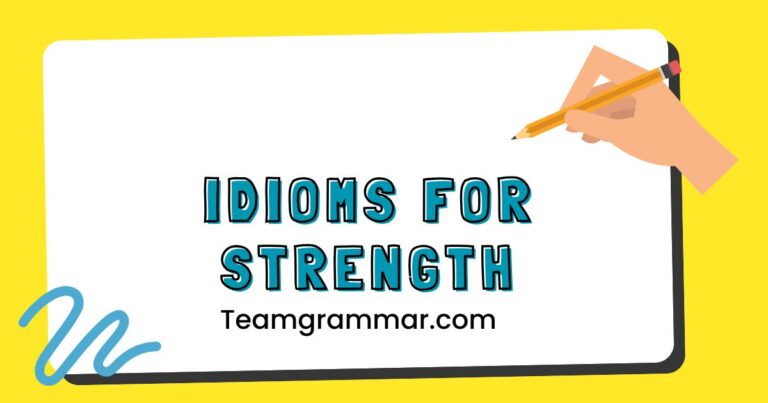37 Idioms for Bedtime: A Comprehensive Guide to Sleepy Expressions
English is rich with idioms, and those related to going to bed are no exception. Understanding these idioms adds color and depth to your comprehension and expression, allowing you to communicate more effectively and naturally.
This article will delve into the world of bedtime idioms, exploring their meanings, origins, and usage. Whether you’re an ESL student, a writer looking to enrich your prose, or simply curious about the nuances of the English language, this guide will provide you with a comprehensive understanding of idioms related to sleep and bedtime.
Table of Contents
- Introduction
- Definition of Idioms for Going to Bed
- Structural Breakdown of Bedtime Idioms
- Types and Categories of Bedtime Idioms
- Examples of Bedtime Idioms
- Usage Rules for Bedtime Idioms
- Common Mistakes with Bedtime Idioms
- Practice Exercises
- Advanced Topics in Bedtime Idioms
- Frequently Asked Questions
- Conclusion
Introduction
Idioms are phrases or expressions whose meanings cannot be understood from the literal meanings of the individual words. They add color, humor, and cultural context to the English language.
Mastering idioms, especially those related to everyday activities like going to bed, can significantly enhance your fluency and comprehension. This article provides a detailed exploration of bedtime idioms, equipping you with the knowledge and skills to use them confidently.
Definition of Idioms for Going to Bed
Idioms for going to bed are expressions that describe the act of preparing for sleep or going to sleep in a figurative or non-literal way. These idioms often evoke images, emotions, or cultural references related to rest and relaxation.
They function as a concise and vivid way to convey the idea of ending the day and seeking rest. The context in which these idioms are used is crucial for understanding their intended meaning.
Classification of Bedtime Idioms
Bedtime idioms can be classified based on their connotations, such as those implying tiredness, eagerness to sleep, or reluctance to go to bed. Some idioms emphasize the physical act of lying down, while others focus on the mental state of preparing for sleep.
The classification helps to understand the various nuances and contexts in which these idioms can be used.
Function of Bedtime Idioms
The primary function of bedtime idioms is to express the idea of going to sleep in a more colorful and engaging manner than simply stating “I’m going to bed.” They add personality and emotion to the conversation, making it more relatable and interesting. Idioms can also convey subtle nuances about the speaker’s feelings or attitude toward sleep.
Contexts for Using Bedtime Idioms
Bedtime idioms are typically used in informal conversations, storytelling, and creative writing. They are less common in formal or academic settings, where precise and literal language is preferred.
Understanding the appropriate context is essential for using idioms effectively and avoiding miscommunication.
Structural Breakdown of Bedtime Idioms
Bedtime idioms, like all idioms, often defy standard grammatical rules when interpreted literally. They typically consist of a combination of verbs, nouns, and prepositions that, when combined, create a unique meaning.
The structure is fixed, meaning that the words cannot be changed or rearranged without altering the idiom’s meaning or making it nonsensical.
For example, the idiom “hit the hay” consists of the verb “hit” and the noun “hay,” connected by the article “the.” Literally, it would imply striking a bundle of dried grass. However, idiomatically, it means to go to bed.
The fixed structure is crucial to maintaining the idiom’s meaning.
Many bedtime idioms involve verbs of motion or action, such as “turn in,” “crash out,” or “call it a night.” These verbs metaphorically represent the transition from activity to rest. The nouns and prepositions often provide additional context or imagery, such as “hit the sack” (evoking the image of a sleeping bag) or “off to dreamland” (suggesting a journey to a land of dreams).
Types and Categories of Bedtime Idioms
Bedtime idioms can be categorized based on their connotations and the specific images or feelings they evoke. Here are some common categories:
Idioms Implying Tiredness or Exhaustion
These idioms emphasize the feeling of being extremely tired and needing to sleep. They often use vivid imagery to convey the depth of exhaustion.
Idioms Implying Eagerness to Sleep
These idioms express a strong desire to go to bed, often due to a long and tiring day. They suggest a sense of anticipation and relief at the prospect of sleep.
Idioms Implying Reluctance to Go to Bed
These idioms convey a feeling of not wanting to go to bed, often due to a desire to continue an activity or a fear of missing out. They suggest a sense of resistance or procrastination.
Idioms Describing the Physical Act of Going to Bed
These idioms focus on the physical actions involved in preparing for sleep, such as getting into bed or turning off the lights. They provide a literal yet figurative description of the bedtime routine.
Idioms Describing the Mental State of Preparing for Sleep
These idioms emphasize the mental process of winding down and preparing for sleep, such as relaxing the mind or letting go of worries. They focus on the psychological aspects of bedtime.
Examples of Bedtime Idioms
Understanding idioms requires seeing them in context. The following tables provide numerous examples of bedtime idioms, categorized by their meaning and usage.
Examples of Idioms Implying Tiredness or Exhaustion
The following table provides examples of idioms that express extreme tiredness. Each idiom is presented with its meaning and an example sentence to illustrate its usage.
| Idiom | Meaning | Example Sentence |
|---|---|---|
| Hit the hay | Go to bed | I’m so tired, I’m going to hit the hay. |
| Hit the sack | Go to bed | After a long day at work, all I want to do is hit the sack. |
| Turn in | Go to bed | It’s getting late; I think I’ll turn in. |
| Call it a night | End the evening and go to bed | We’ve been working hard all day; let’s call it a night. |
| Crash out | Fall asleep quickly and deeply | I was so exhausted that I crashed out as soon as my head hit the pillow. |
| Catch some Z’s | Get some sleep | I need to catch some Z’s before my early morning meeting. |
| Get some shut-eye | Get some sleep | I’m going to try and get some shut-eye on the plane. |
| Go nighty-night | Go to bed (often used with children) | Time to go nighty-night, sweetie. |
| Be off to dreamland | Go to sleep and enter a world of dreams | I’m off to dreamland; goodnight! |
| Turn in for the night | Go to bed for the night | I’m going to turn in for the night; see you in the morning. |
| Go to bed with the chickens | Go to bed very early | My grandfather always goes to bed with the chickens. |
| Sleep like a log | Sleep very soundly | I slept like a log last night; I feel so refreshed. |
| Sleep like a baby | Sleep very soundly and peacefully | After the stressful week, I slept like a baby. |
| Drop off to sleep | Gradually fall asleep | I dropped off to sleep while reading my book. |
| Drift off to sleep | Gently fall asleep | The gentle music helped me drift off to sleep. |
| Be dead to the world | Be sleeping very deeply | I was so tired that I was dead to the world. |
| Out like a light | Fall asleep very quickly and completely | He was out like a light as soon as he lay down. |
| Nod off | Fall asleep unintentionally or briefly | I nodded off during the movie. |
| Doze off | Fall into a light sleep | I like to doze off in my armchair after lunch. |
| Sack out | Go to bed and sleep | I’m going to sack out after this long day. |
| Turn out the lights | Switch off the lights before going to bed | Don’t forget to turn out the lights before you go to bed. |
| Say your prayers | Pray before sleeping | Remember to say your prayers before you go to bed. |
| Tuck yourself in | Make yourself comfortable in bed | I’m going to tuck myself in and read a book. |
| Pull the covers over your head | Hide in bed, usually to sleep | I just want to pull the covers over my head and forget about everything. |
| Count sheep | Try to fall asleep by imagining sheep jumping over a fence | If you can’t sleep, try to count sheep. |
Examples of Idioms Implying Eagerness to Sleep
The following table showcases idioms that express a strong desire to go to bed, often after a tiring day. The examples illustrate the speaker’s anticipation of rest.
| Idiom | Meaning | Example Sentence |
|---|---|---|
| Can’t wait to hit the hay | Eager to go to bed | I can’t wait to hit the hay after this marathon. |
| Looking forward to hitting the sack | Anticipating going to bed | I’m looking forward to hitting the sack tonight. |
| Ready to turn in | Prepared to go to bed | I’m ready to turn in; it’s been a long day. |
| Anxious to call it a night | Eager to end the evening and go to bed | I’m anxious to call it a night and get some rest. |
| Eager to crash out | Looking forward to falling asleep quickly | I’m so tired, I’m eager to crash out. |
| Longing to catch some Z’s | Desiring to get some sleep | I’m longing to catch some Z’s before my trip. |
| Yearning to get some shut-eye | Craving to get some sleep | I’m yearning to get some shut-eye after this project. |
| Wanting to be off to dreamland | Desiring to go to sleep and dream | I’m wanting to be off to dreamland; goodnight! |
| Impatient to turn in for the night | Eager to go to bed for the night | I’m impatient to turn in for the night and relax. |
| Desperate to sleep like a log | Wanting to sleep very soundly | I’m desperate to sleep like a log tonight. |
| Champing at the bit to hit the hay | Extremely eager to go to bed | After working two jobs today I am champing at the bit to hit the hay. |
| Counting the hours until I can hit the sack | Eagerly anticipating bedtime | I am counting the hours until I can hit the sack, this day has been brutal. |
| Practically sprinting to bed | Going to bed very quickly due to tiredness | I was so exhausted I was practically sprinting to bed. |
| Dreaming of my pillow | Thinking a lot about going to sleep | I’ve been dreaming of my pillow all day. |
| Just waiting for the moment I can crash out | Very excited to go to sleep | I’m just waiting for the moment I can crash out. |
| Can’t wait to be dead to the world | Eager to be in a deep sleep | I can’t wait to be dead to the world to forget about my problems. |
| Looking forward to being out like a light | Anticipating falling asleep quickly | I’m looking forward to being out like a light tonight. |
| Ready to pull the covers over my head | Eager to hide in bed and sleep | I’m ready to pull the covers over my head and escape reality. |
| Excited to drift off to sleep | Looking forward to gently falling asleep | I’m excited to drift off to sleep with my new audiobook. |
| Counting down the minutes until I can turn in | Eagerly awaiting bedtime | I’m counting down the minutes until I can turn in. |
| Longing for slumber | Having a strong desire to sleep | After such a long day, I am Longing for slumber. |
| Pining for my bed | Missing the comfort of one’s bed | Being away from home, I am really pining for my bed. |
| Yearning for a good night’s rest | Having a strong desire for restful sleep | After weeks of insomnia, I am yearning for a good night’s rest. |
| Craving a deep sleep | Desiring a profound and restful sleep | I am craving a deep sleep to recover from the stress of the exams. |
Examples of Idioms Implying Reluctance to Go to Bed
This table provides examples of idioms that convey reluctance to go to bed, often due to wanting to continue an activity. The examples illustrate the speaker’s resistance to sleep.
| Idiom | Meaning | Example Sentence |
|---|---|---|
| Not ready to call it a night | Not wanting to end the evening | I’m not ready to call it a night; let’s watch another movie. |
| Resisting turning in | Reluctant to go to bed | I’m resisting turning in; I want to finish this book. |
| Hesitant to hit the hay | Unwilling to go to bed | I’m hesitant to hit the hay; there’s a great show on TV. |
| Loth to hit the sack | Reluctant to go to bed | I’m loth to hit the sack; I have so much energy. |
| Putting off turning in for the night | Delaying going to bed | I’m putting off turning in for the night; I want to see the sunrise. |
| Dreading to catch some Z’s | Reluctant to go to sleep | I’m dreading to catch some Z’s; I have a big test tomorrow. |
| Unwilling to get some shut-eye | Not wanting to go to sleep | I’m unwilling to get some shut-eye; I’m having too much fun. |
| Loath to be off to dreamland | Reluctant to go to sleep and dream | I’m loath to be off to dreamland; I have so much to do. |
| Dragging my feet to bed | Going to bed reluctantly | I am dragging my feet to bed because I’m not tired yet. |
| Fighting the urge to sleep | Trying to stay awake | I am fighting the urge to sleep so I can finish this project. |
| Struggling to turn in | Having difficulty convincing oneself to go to bed | I’m struggling to turn in, I feel like I have so much to do. |
| Resisting the call of the bed | Ignoring the feeling of tiredness | I’m resisting the call of the bed, I want to stay up a little longer. |
| Procrastinating bedtime | Delaying going to bed | I’m procrastinating bedtime by watching another episode of my favorite show. |
| Putting off hitting the hay | Delaying going to bed | I’m putting off hitting the hay because I want to finish this game. |
| Not quite ready for dreamland | Feeling like it’s not yet time to go to sleep | I’m not quite ready for dreamland, I want to read a few more pages. |
Usage Rules for Bedtime Idioms
Using idioms correctly requires understanding their nuanced meanings and appropriate contexts. Here are some key rules to follow:
- Context is crucial: Ensure the idiom fits the situation and tone of the conversation.
- Audience awareness: Consider your audience’s familiarity with idioms. Overusing them or using obscure ones can confuse listeners.
- Figurative meaning: Remember that idioms are not meant to be taken literally. Focus on the overall meaning of the phrase.
- Fixed structure: Do not alter the words or word order of an idiom, as this can change its meaning or make it nonsensical.
- Informal settings: Use idioms primarily in informal conversations, storytelling, and creative writing. Avoid them in formal or academic settings.
Exceptions and Special Cases
While idioms generally have a fixed structure, some may allow for slight variations depending on the context. For example, “hit the hay” and “hit the sack” are often used interchangeably.
However, it’s important to be aware of the specific nuances of each idiom and avoid making significant alterations.
Some idioms may also have regional variations or slightly different meanings depending on the dialect. It’s helpful to be aware of these variations and to use idioms that are appropriate for your audience and location.
Common Mistakes with Bedtime Idioms
Here are some common mistakes to avoid when using bedtime idioms:
- Literal interpretation: Taking the idiom literally instead of understanding its figurative meaning.
- Incorrect word order: Altering the word order of the idiom, which can change its meaning or make it nonsensical.
- Inappropriate context: Using idioms in formal or academic settings where they are not appropriate.
- Overusing idioms: Using too many idioms in a conversation, which can make your speech sound unnatural or forced.
- Misunderstanding nuances: Not fully understanding the subtle nuances of an idiom, which can lead to miscommunication.
The following table provides examples of common mistakes and their corrections:
| Incorrect | Correct | Explanation |
|---|---|---|
| I’m going to hit the hay literally. | I’m going to hit the hay. | Avoid literal interpretation. |
| I’m going the hay to hit. | I’m going to hit the hay. | Maintain the correct word order. |
| In my academic paper, I will hit the hay. | I will go to bed. | Use formal language in academic writing. |
| I’m going to hit the hay, hit the sack, and turn in. | I’m going to hit the hay. | Avoid overusing idioms in one sentence. |
| I’m going to catch some Z’s, meaning I’m going to watch TV. | I’m going to catch some Z’s, meaning I’m going to sleep. | Understand the correct meaning of the idiom. |
Practice Exercises
Test your understanding of bedtime idioms with these exercises:
Exercise 1: Fill in the Blanks
Fill in the blanks with the correct bedtime idiom from the list below:
Idiom List: hit the hay, turn in, call it a night, crash out, catch some Z’s
| Question | Answer |
|---|---|
| 1. I’m so tired; I think I’ll just __________. | turn in |
| 2. After a long day, I just want to __________ as soon as possible. | crash out |
| 3. It’s getting late; let’s __________ and go home. | call it a night |
| 4. I need to __________ before my early morning flight. | catch some Z’s |
| 5. I’m exhausted; I’m going to __________. | hit the hay |
| 6. We’ve been working all day, let’s __________ and get some rest. | call it a night |
| 7. The kids are tired, it’s time for them to __________. | turn in |
| 8. I’m going to __________ early tonight to prepare for the marathon tomorrow. | hit the hay |
| 9. After the party, I’m just going to __________ on the couch. | crash out |
| 10. I really need to __________ to be ready for the meeting tomorrow. | catch some Z’s |
Exercise 2: Matching
Match the idiom with its correct meaning:
| Idiom | Meaning |
|---|---|
| 1. Hit the sack | a. Go to sleep quickly |
| 2. Out like a light | b. Go to bed |
| 3. Sleep like a log | c. Go to sleep and dream |
| 4. Be off to dreamland | d. Sleep very soundly |
Answers:
| Question | Answer |
|---|---|
| 1. Hit the sack | b. Go to bed |
| 2. Out like a light | a. Go to sleep quickly |
| 3. Sleep like a log | d. Sleep very soundly |
| 4. Be off to dreamland | c. Go to sleep and dream |
Exercise 3: Sentence Completion
Complete the following sentences using an appropriate idiom for going to bed.
| Question | Answer |
|---|---|
| 1. After the exhausting hike, I was ready to __________. | crash out |
| 2. It’s late, I think I’m going to __________. | turn in |
| 3. The baby was so tired that she _________ as soon as she was put in her crib. | was out like a light |
| 4. I’m so tired, I can’t wait to __________. | hit the hay |
| 5. We should __________, it’s getting late and we have an early start tomorrow. | call it a night |
| 6. I need to ________ before the big game tomorrow. | catch some Z’s |
| 7. After the stressful week, I _________. | slept like a baby |
| 8. He was so tired that he was _________. | dead to the world |
| 9. The gentle music helped me _________. | drift off to sleep |
| 10. I am so tired I can’t wait to _________. | tuck myself in |
Advanced Topics in Bedtime Idioms
For advanced learners, exploring the etymology and cultural significance of bedtime idioms can provide a deeper understanding of their usage and context.
Researching the origins of idioms like “hit the hay” (referencing sleeping on straw-filled mattresses) or “turn in” (referencing the act of folding oneself into bed) can reveal fascinating insights into the historical and cultural contexts that shaped these expressions.
Additionally, comparing bedtime idioms across different languages and cultures can highlight the universal human experience of sleep and rest, as well as the unique ways in which different cultures express this experience through language.
Frequently Asked Questions
-
Q: What is an idiom?
A: An idiom is a phrase or expression whose meaning cannot be understood from the literal meanings of the individual words. It’s a figurative expression that has a conventional meaning understood by native speakers.
-
Q: Why are idioms important to learn?
A: Idioms add color and depth to your language, making you sound more natural and fluent. Understanding idioms also improves your comprehension of spoken and written English.
-
Q: Can I change the words in an idiom?
A: Generally, no. Idioms have a fixed structure, and changing the words can alter the meaning or make the idiom nonsensical. However, some idioms may have slight variations depending on the context.
-
Q: Where can I use idioms?
A: Idioms are best used in informal conversations, storytelling, and creative writing. Avoid using them in formal or academic settings, where precise and literal language is preferred.
-
Q: How can I learn more idioms?
A: Read books, watch movies, and listen to podcasts in English. Pay attention to the way native speakers use idioms in their conversations. Use online resources and idiom dictionaries to expand your vocabulary.
-
Q: What is the difference between an idiom and a proverb?
A: An idiom is a phrase with a figurative meaning, while a proverb is a short, well-known saying that expresses a general truth or piece of advice. Proverbs often have a moral or ethical message.
-
Q: How do I know when to use an idiom?
A: Consider the context, your audience, and the tone of the conversation. If you’re unsure whether an idiom is appropriate, it’s best to use a more literal expression.
-
Q: Are idioms universal across all English-speaking countries?
A: No, some idioms are regional or specific to certain English-speaking countries. Be aware of these variations and use idioms that are appropriate for your audience and location.
-
Q: Are there idioms that should be avoided because they are outdated or offensive?
A: Yes, language evolves, and some idioms can become outdated or carry offensive connotations over time. It’s good practice to stay informed about current language standards and be sensitive to the potential impact of your words. When in doubt, it’s best to avoid idioms that may be considered problematic.
-
Q: What’s the best way to remember idioms?
A: The best way to remember idioms is through repeated exposure and active use. Try writing sentences using the idioms, using flashcards, or practicing them in conversations. Understanding the origin or story behind an idiom can also help you remember it better.
Conclusion
Mastering idioms for going to bed enriches your understanding and use of the English language. By grasping their meanings, structures, and usage rules, you can communicate more effectively and expressively.
Remember to consider the context, audience, and nuances of each idiom to avoid miscommunication. Continue practicing and expanding your idiom vocabulary to enhance your fluency and confidence in English.
Learning idioms is an ongoing process. By incorporating these expressions into your daily conversations and writing, you’ll gradually develop a deeper understanding and appreciation for the richness and complexity of the English language.
Keep exploring, keep practicing, and enjoy the journey of linguistic discovery!







